|
Soldiers assist in home gardening :
Jaffna, a thriving agricultural hub
By Shanika SRIYANANDA in Jaffna
If you want to repair your old wrist watch or antique clock, the
ideal watch maker in Jaffna would be Mohan Kumar. He mastered the art of
watch repairing, which is his first job, over 35 years ago by deftly
handling the tiny gadgets that makes a watch a tick, he has now started
the business once again in a small way. With watches turning digital,
his business is no longer lucrative, occasionally he gets some, old
clocks, to repair.
|
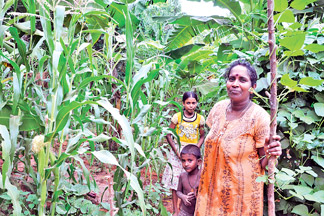
Chitra and her family in their home garden |
|
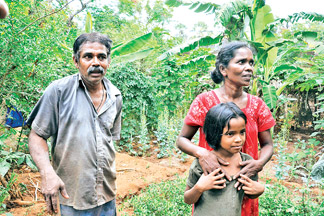
Kumar, the watch maker turned farmer with his wife |
As the meagre income he earns from repairing watches and also as a
casual labourer is not enough to feed a family of five, the 52-year-old
is now determined to cultivate the small plot of land belonging to his
wife with some vegetables enough for his family.
Though his hands, which are trained to handle tiny gadgets, are
struggling to cope with the red fertile soil in his land in Manipay,
where he grows vegetables, fruits to green leaves. Vegetables and green
leaves in the neatly arranged beds have more fresh leaves and flowers.
His hard work is bearing fruit. Kumar and his family have turned the
20 perches of barren land into a home garden. His garden is one among 10
home gardens in Manipay, where soldiers of the 11 Singha Regiment helped
them to turn their neglected lands into fertile home gardens.
Army
The Army gave us seeds and fertiliser free- of- charge and the
soldiers helped us to prepare the land for cultivation. They also
provided us water facilities for the land. I never thought, we would
have a home garden, Kumar, who sells green leaves from his garden said.
Unlike many in Jaffna who have not experienced LTTE terror during the
end battle in 2009 May, Kumar's family his wife, son and three
daughters- had a narrow escape. We are lucky that soldiers saved our
lives", he recalled their 'hard walk' through 'death'.
Kumar, who is originally from Jinthupitiya, Colombo, sought a job as
a watch maker in Jaffna and married his sweet heart, Devambika from
Manipay in 1989 amidst strong opposition from his family.
|

Prof. G. Mikunthan |
The marriage separated him from his family of eight sisters and
brothers, who are now doing well in their lives, as he married a Tamil.
Kumar, who got a job in Kilinochchi in 2002 settled down with his
family. Unfortunately, the A-9 road was closed and thousands of people
like Kumar were stranded in Kilinochchi and Mullaitivu.
Kumar was not allowed to return as he is a half Sinhalese (mother of
Sinhalese) and he said the LTTE kept a sharp eye on him due to his
ethnicity. He was lucky as he was rejected from the LTTEs Makkal padei
group (military training for civilians). He earned a living as a
labourer but repaired watches too.
While the battle was intensifying and soldiers capturing LTTE
dominated areas the LTTE herded civilians from Kilinochchi to
Puthukudiriyappu. Kumar and thousands of civilians ran from Kaiveli
through the Paranthan road to Thewapuram to Puthumathalan to Pokkanei
and lastly to Ampalavanpokkanei, where they were rescued by soldiers on
May 17, 2009.
"My son was 17-years and schooling at the Puthukudiriyappu Tamil
School when the LTTE took him. We all cried but they threatened us and
took my son and all the teenagers in our area to fight. Terrorists had
given grenades to my son to throw at soldiers. They had put teenagers
like him to face the Army. My son said the other sons were cried and
pleaded with senior terrorists to let them go home. He said one was shot
dead", Kumar said in broken Sinhalese.
His son Janusha, who now studies in Hindu College Colombo, escaped
and returned to his parents. "We hid our children in two barrels during
the day time.
The LTTE police came to snatch children but they could not find them.
During the night we take them out one by one and allow them to use the
toilet. Food, mainly the boiled rice and dhal was given to them, while
hiding inside these barrels. They eat once a day", Dewambika recalled.
"Kumar said the LTTE lost its popularity after 2006 as the terrorists
became too harsh to civilians by taking ransom, taxing people and
forcibly recruiting children to fight.
|
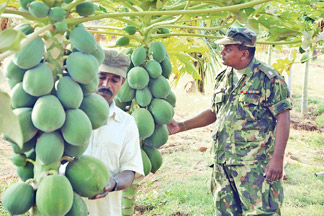
A papaya cultivation at the SFHQ farm |
He said the LTTE a week before its defeat had burnt a massive amount
of money including rupees, dollars, Euro and lots of other foreign
currencies collected from people, at Mulliyaveli.
He then lived in Zone 4 in the Seddikulam Welfare Centre in Vavuniya
and resettled in Manipay recently.
Now the family is living in a make-shift hut with no cement walls and
a floor and with no furniture, but he said they were happy to lead a
peaceful life.
"We have nothing to say as ours except this land that I got as dowry.
The LTTE destroyed our future. Today Tamils are struggling to stand on
their own feet", said Kumar, who buried his 'wealth', his tools used to
repair watches, before they ran from Puthumathalan. He sold the little
gold, his last ounce of wealth, to treat his son who was badly injured
during the battle.
Being an asthmatic, Kumar struggles to give a secure future to his
three girls Vaishnai, who is doing her ALs soon, Dianna, who is studying
in grade 9 and the youngest Dulakshana (9) and boy Janusha. He said they
are lucky parents as their children are bright students.
Kumar without waiting to earn from his dying business -watch
repairing- is trying hard to improve the yield from his small home
garden to save money. The chicks given free of charge by the Army are
matured enough to lay eggs.
Encouragement
He thanked the soldiers for encouraging him to be a gardener, holding
live hopes high to build a small decent house, as financial support to
continue his children's education and to find a job.
|

Corn is found in plenty |
Being a gardener he natures the desire to own a water motor to avoid
water bringing from far away wells to water his garden.
Chithra Thaniasalam in Manipay has a well-grown home garden in her
two acre land. Returned to her home five-years-ago, she started growing
vegetables on a small scale until the Army encouraged her to develop her
garden to a fine home garden, on a larger scale.
"The Army gave us seeds and fertiliser. They even prepared the land
for us to grow", the 48-year-old mother of four said.
Vegetables, fruits and green leaves are grown in her garden, giving
her an additional income by selling them at the small boutiques in the
area.
Green leaves fetch the highest price as they are grown using compost
made in the garden.
"We like to continue gardening. My children help me in the garden
after school and as the vegetables are fresh and grown with less
chemical fertiliser they have high nutrition and give a good taste", she
said.
Chithra's husband, a toddy trapper, earns less now due to the
vanishing palmyra trees in Jaffna caused by rapid development.
She is happy as she is able to reduce her daily expenses nearing Rs.
500 as she gets vegetables from her garden.
Today Kumar and Chithra are among 250 families who have developed the
concept of home gardening in the Jaffna Peninsula.
Taking the government's concept of self-sufficiency, Api wawamu, Rata
nagamu (Lets grow to develop the country) implemented under the Mahinda
Chinthana policy into villages in Jaffna, under the directions of
Security Forces (SF) Commander Maj. Gen. Mahinda Hathurusinghe, all
brigades under its Divisions 51,52 and 55 have promoted the home garden
concept to strengthen the home economy and also the national economy.
Setting an example, the farm spanning over 35 acres at the SF Head
Quarters was expanded to nearly 100 acres. With the monthly yield of
over 60,000 kilos of vegetables and fruit, all the seasonal vegetables
are grown in the farm by a labour force of 135 soldiers.
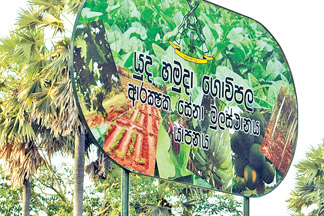
" This farm is in existence for the last 20 years but it was
systematically started in 2010.
It had a monthly yield of 4,000 kilos but today we get over 60,000
kilos of all vegetables and fruit. There is a high yield as we mainly
use organic fertiliser", Maj. R.N. Dharmatilake Officer-in-charge of the
Farm said.
Of the total yield, over 20,000 kilos are consumed by the Army and
the other 40,000 kilos are sold at the markets in Achchuweli, Kodikamam,
Jaffna, Maradanamadu and Thilinaweli.
The profit will go to the development fund at the SF headquarters
which is used to modernise Tal Sevana, the Army resort in Jaffna.
Rupees two million was donated to the Army's Abimansala, the welfare
project for disabled soldiers, and also to construct houses for
displaced civilians in Jaffna.
Vegetables that were sold at the Army's New Year pola at Panagoda
were grown on this farm.
The 51 Division, which also promotes home gardening in all its
brigades and villages under its purview, has a small home garden, where
soldiers have grown vegetables instead of flowers. Old tyres, used gunny
bags, old paint tins and whatever that can be used to grow plants have
become pots of vegetables.
" We have started this in a small way. The small harvest is enough
for daily consumption. As the beet root season is over now, we are
preparing the soil to grow carrots. The new pumpkin variety 'watana',
manioc, green chillies, snake gourd and green leaves like mukunuwenna
and kankun grow well in this fertile soil", Commander of 513 Brigade,
Brig. Pradeep de Silva said.
He said families who join to develop home gardens are keen to turn
their gardens into successful home gardens and the rapport between the
Army and villagers had also grown strong.
Prof. G. Mikunthan, Head of the Department of Agricultural Biology,
Faculty of Agriculture, University of Jaffna said that it was amazing to
see sandy soil in Champiyanpaththu being utilised by farmers to grow
vegetables successfully with the help of soldiers.
The progress of home gardens was evaluated to select the best home
garden in a competition organised by the SFHQ by a five member board,
last week.
The team led by the Head of the Department of Agricultural Biology,
Faculty of Agriculture, University of Jaffna Prof. G. Mikunthan visited
30 home gardens coming under the 51, 52 and 55 divisions areas covering
Manipay to Iyakachchi and Chembianpattu and selected 15 in the final
round.
Prof. Mikunthan told the Sunday Observer that it was great to see the
rapport between soldiers and villagers involved in developing home
gardens.
"We spoke to some farmers and they told us that Army personnel helped
them a lot to start their home gardens. We learn that soldiers prepared
the land, provided seeds and fertiliser to them.
We also gathered a lot of experience.
|
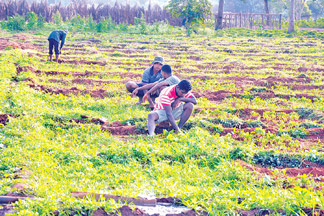
Soldiers at the farm |
It is really challenging to grow vegetables successfully in some
areas such as Champiyanpaththu in the 55 Division area, but the effort
of the soldiers and the enthusiasm of farmers have overcome all
difficulties. The contribution made by the soldiers is immense", he
said.
Home gardens
He said establishing home gardens was in the action plan of the
Department of Agriculture, Agrarian services and other non-governmental
organisations but not in the Army's schedule. However, seeing the Army
being actively involved in livelihoods of the people was a welcome sign.
Giving priority to the 'Mahinda Chintana', army personnel are actively
involved in establishing home gardens for resettled families to sustain
their livelihood. We have been invited to evaluate home gardens
established in Jaffna at various places where available resources are
well utilized.
The Valikamam area has fertile soil and home gardens are well
established. However, rocky areas have also been made colourful by
growing plants in poly bags and other containers, he said. Prof.
Mikunthan invited outsiders to learn lessons about home gardening said
these small home gardens would definitely be the role models, which
others should follow. "These home gardens will definitely encourage
others to grow more in their gardens. In every home garden soldiers are
involved in providing inputs and in some places even water pumps. It was
very difficult to grow crops in certain areas due to the sandy soil and
no water source, however with the help of soldiers villagers have grown
vegetables well.
There are vegetables, pulses, leafy vegetables, fruit crops,
medicinal plants, spices, ornamental plants and roots and rhizomes for
their daily consumption and the excess is sold to generate an income for
them", he said.
He thanked the Army for encouraging villagers to grow pesticide
free-vegetables and fruits especially green leafy vegetables as no
pesticides are use in home gardens. "this concept is also very helpful
to families where women are the heads. Even the fisher folk are taking
to gardening now as they have realised the value of the home-gardening
concept", he said adding that villagers in Chavakachcheri, Palay,
Thalayady, Chembianpattu, and Iyakachchi, which have sandy soil, have
grown vegetables thanks to the soldiers, who provided water facilities.
Referring to development taking place in the Jaffna peninsula, Prof.
Mikunthan said people in Jaffna were happy as there was a lot of support
from the government to uplift the living standard of the people
including the recently resettled civilians.
The winners of the home gardening competition will be given a land
master tractor, 10 water motors and agricultural equipment at a ceremony
scheduled to be held on July 19. |

